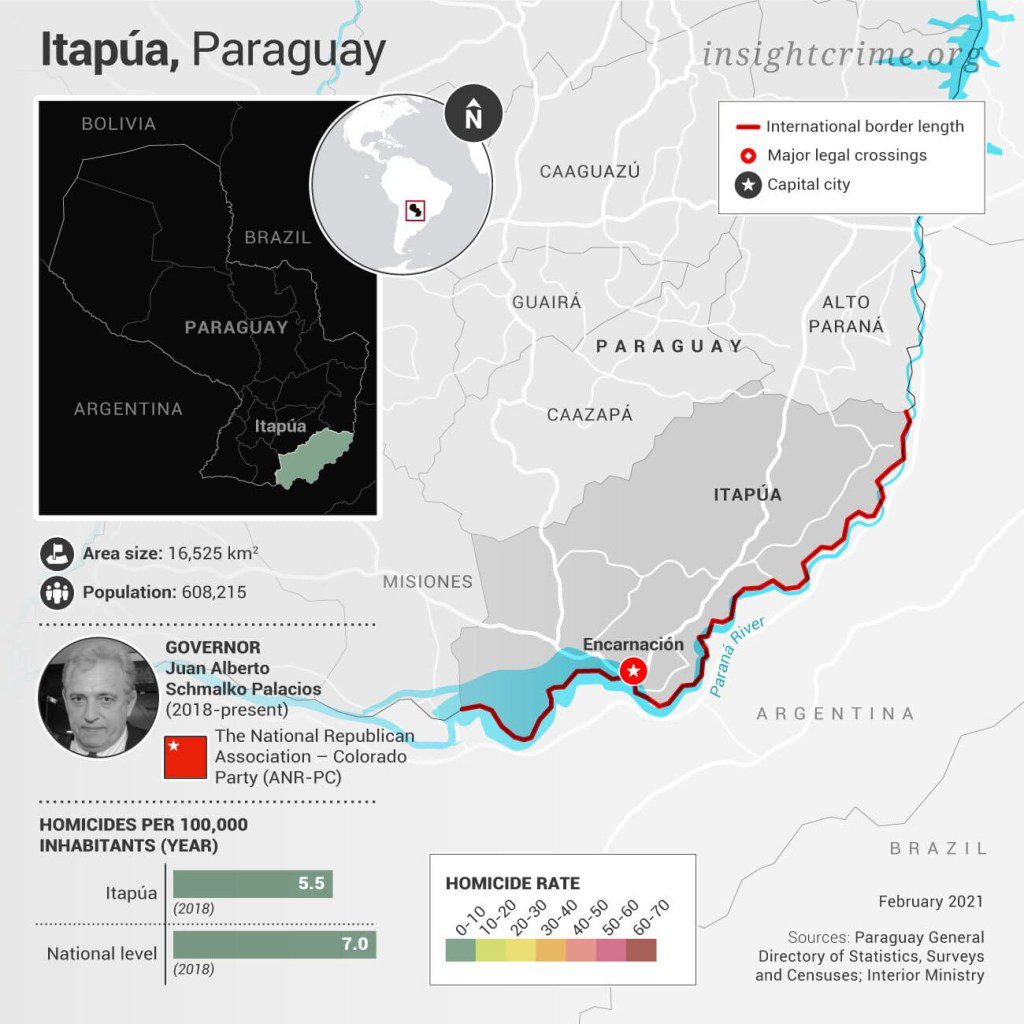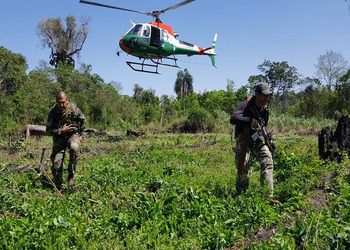Itapúa is a minor marijuana producer but an important transit corridor for cannabis smuggled into Argentina. Some areas of the river border it shares with Argentina are considered hotspots for marijuana trafficking by authorities in both countries.
All manner of contraband is trafficked across the Paraná River and into the departmental capital of Encarnación, connected by bridge to Posadas, the provincial capital of Misiones, in neighboring Argentina.
The department also houses incarcerated members of the Brazilian gang, the First Capital Command (Primeiro Comando da Capital – PCC), who constitute a latent threat.


Criminal Actors
First Capital Command (Primeiro Comando da Capital – PCC): The PCC appears to be present in Encarnación, where they are suspected of drug trafficking and infiltrating the police and mayor’s office. However, the gang’s presence is not well-established. Rather, it is limited to a local prison where around 100 PCC members are incarcerated.
Red Command (Comando Vermelho – CV): The presence of the Red Command in the department’s capital, Encarnación, was exposed with the arrest of Marcelo Piloto. This appears to have been an isolated case and there is little indication of a permanent CV presence in Itapúa.
Criminal Economies
Arms Trafficking: Itapúa is a transit point for illicit weapon shipments heading to Argentina and firearms trafficked to Ciudad del Este. In 2019, authorities seized 40 firearms in the department. It is not clear what type of weapons these were, but past press reports suggest that it is primarily small arms that are trafficked through the department, and this appears to be a small criminal economy.
Cocaine: Criminal groups only started moving cocaine through the department in the mid-2010s. This may have been the result of increased antinarcotics controls in Argentinian provinces such as Salta, from where cocaine previously entered the country. Planes carrying cocaine from Bolivia land in rural areas of Itapúa – mostly in Coronel Bogado. From there, the drug is transported in small quantities to the Argentinian province of Misiones, bound for Buenos Aires and Montevideo, in Uruguay. In 2019, authorities seized 30 kilograms of cocaine in the department, and in 2018, authorities seized 450 kilograms. This is a small but growing criminal economy.
Cannabis: Cannabis is produced in Itapúa and the department also serves as a through-route to Argentina. In 2019, 156 hectares of cannabis plantations were eradicated in the department. One hectare can produce an estimated 750 kilograms of cannabis. The eradicated crops could therefore have produced some 117 tons of marijuana. The same year, authorities seized 6.9 tons of processed cannabis. The border between Itapúa and Misiones, Argentina, is one of the main points through which Paraguayan marijuana enters the neighboring country. Minimal state vigilance and widespread corruption allows cannabis shipments to flow through the department with ease, making this a significant criminal economy.
Environmental Crime: There is some evidence of timber trafficking in Itapúa, especially in the San Rafael Nature Reserve. However, no major criminal groups appear to be involved in this activity; the wood seems largely for domestic consumption.
Human Trafficking: Encarnación is emerging as a tourist destination for both Argentinians and Paraguayans, increasing the incidence of human trafficking. Minors are subjected to forced labor in the department, particularly in summer months. Sex trafficking has also increased. For the most part, sex and labor trafficking takes place within the department. However, victims are also sent from Itapúa to Argentina and Europe.
Contraband: The border between Itapúa and Misiones is a key crossing point for goods smuggled between Paraguay and Argentina. Corruption among local authorities facilitates this activity. All kinds of contraband products are smuggled into Paraguay, as the cost of industrial and agricultural products is much lower. Cleaning products, food and liquor are among the most commonly smuggled items of contraband. Cigarettes and electronics are trafficked in the opposite direction. The most important smuggling roues include clandestine ports located along the Paraná river and the bridge separating Encarnación and Posadas. There is also a route from Paraje Nemecio Parma to Jardín América, Argentina, and between Mayor Otaño and El Dorado, also in Argentina.
Money Laundering: Money laundering is common in Encarnación, partially due to its booming tourism sector. The construction sector, pharmacies and gas stations are also used to conceal the proceeds of illicit activities. One of the most important money laundering cases in the department involved an infamous Brazilian criminal, Jarvis Chimenes Pavão, who owned several pharmacies in the city used to launder money.
Sources: This profile is based on a field investigation in Encarnación and four trips to Asunción where InSight Crime interviewed political leaders, Interior Ministry officials, the Attorney General’s Office, the National Anti-Corruption Secretariat (Secretaría Nacional Anticorrupción – SENAC), the National Anti-Drug Secretariat (Secretaría Nacional Antidrogas – SENAD), the Secretariat for the Prevention of Money or Assest Laundering (Secretaría de Prevención de Lavado de Dinero o Bienes – SEPRELAD), Paraguay’s anti-human trafficking unit, prison officials, the National Directorate of Civil Aviation (Dirección Nacional de Aeronautica Civil – DINAC), national police, judicial officials, the governor’s office, municipal authorities in Encarnación, local prosecutors, non-governmental organizations working on human rights and environmental issues, community leaders, and local journalists, most of whom requested anonymity. InSight Crime also drew from information provided by Paraguay’s Interior Ministry, the General Directory of Statistics, Surveys and Censuses, and local press.

